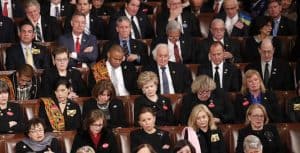
Stony-faced Democrats at President Trump’s first State of the Union address
President Trump’s State of the Union (SOTU) address last night provided a good summary of his administration’s many accomplishments in his first year of office. A full transcript of the speech is here. The speech was well received by the viewing public. though not by Congressional Democrats.
That said, some problems appeared in the outline of the administration’s plans for the future.
Infrastructure: Many aspects of the President’s approach to infrastructure investment were applauded by analysts except for the President’s endorsement of Federal expenditure. Cato’s analyst writes:
New federal subsidies are not needed. Any state wanting to improve its infrastructure can do so with its own funding. States have huge revenue-raising power through income, sales, property, and gas taxes. They can issue debt for infrastructure, and charge user fees. They can also privatize infrastructure—such as airports and seaports—and end subsidies.
Federal infrastructure subsidies are often counterproductive. As I discuss here, they distort state decision making, replicate mistakes across the country, come with costly regulations, and add bureaucracy.
Federal funds not going to subsidize the states could more properly be spent on the underfunded military. The one infrastructure investment that should be considered by the national government is civil defense and the hardening of infrastructure against enemy attack.
Defense: John Bolton has a good summary of the foreign policy / security aspect of last night’s SOTU. He praises Trump’s call for renewing the US nuclear arsenal but rightly notes a serious omission from the President’s talk:
I wish the president had also stressed the profound need to rapidly scale up our national missile defense capabilities, a program that was all but eviscerated during the Obama administration. Indeed, we must devote far more attention to capabilities beyond the original Bush program, which focused on addressing the relatively limited threats of the rogue states, which might have the capability to launch handfuls rather than hundreds of ballistic missiles at American targets. It is past time to return to Reagan’s original vision of “strategic defense,” so that the United States can have adequate defenses against Russia’s large, newly upgraded and modernized missile arsenals, and also against China’s rapidly increasing capabilities.
In past issues, we have referenced the original Reagan perspective, as powerfully presented by Angelo Codevilla. It involves much more than scaling up today’s crippled technologies and instead implementing a space-based, over-the-horizon missile defense, the technologies that Democrats foolishly derided as “Star Wars.”
Immigration: The President is quite right in wanting to scrap the immigration lottery and chain immigration. Democrats and Republicans in Congress are squabbling in multiple factions over whether to have a little immigration deal or a big one. But none are addressing — front and center and not just by implication (as in “Norway vs Haiti”)– the three fundamental principles that should be guiding immigration policy:
- Limiting immigration to those who identify with the founding vision of the US, as enshrined in the Declaration of Independence and the Constitution. We don’t want welfare seekers, anchor babies, birth tourism, or Sharia supporters.
- We want immigrants who will be able to obtain productive jobs without displacing US citizens or reducing their wages.
- We want as large a population that satisfies the two conditions above and can be assimilated readily and productively in some local community in the US.

Ellis Island, which welcomed hundreds of thousands of immigrants from Europe during a great period of growth and industrialization in the US
We don’t think the President would have a problem with the first two principles above. With regard to the third principle, he and other Republicans are advocating a restrictionist immigration policy. But when the economy is humming as it is at present, and with good tax and regulatory policies, there’s no reason we shouldn’t accept as many immigrants as possible who satisfy the first two conditions. The President and most Republicans are pro-natalist. In consistency, they should be for a well-vetted pro-immigration policy as well.
However, immigration policy shouldn’t be legislated at all until there is a sensible policy for visitors, seasonal guest workers, and medium-term guest workers. Both the Congress and the President are ignoring that basic point. We believe that a good part of the illegal immigrant problem will go away if that is done. Many of the illegal immigrants would be happy to be here as seasonal or medium-term guest workers, then return to their native countries. It’s the impediments to going back and forth between their home countries and the US that has impelled many of them to simply put down stakes as illegals in the US.
Click here to go to the previous issue of Founders Broadsheet (“So far, President Trump’s protectionism has been hurting allies, not China, and bailing out Wall Street”)

Leave a Reply